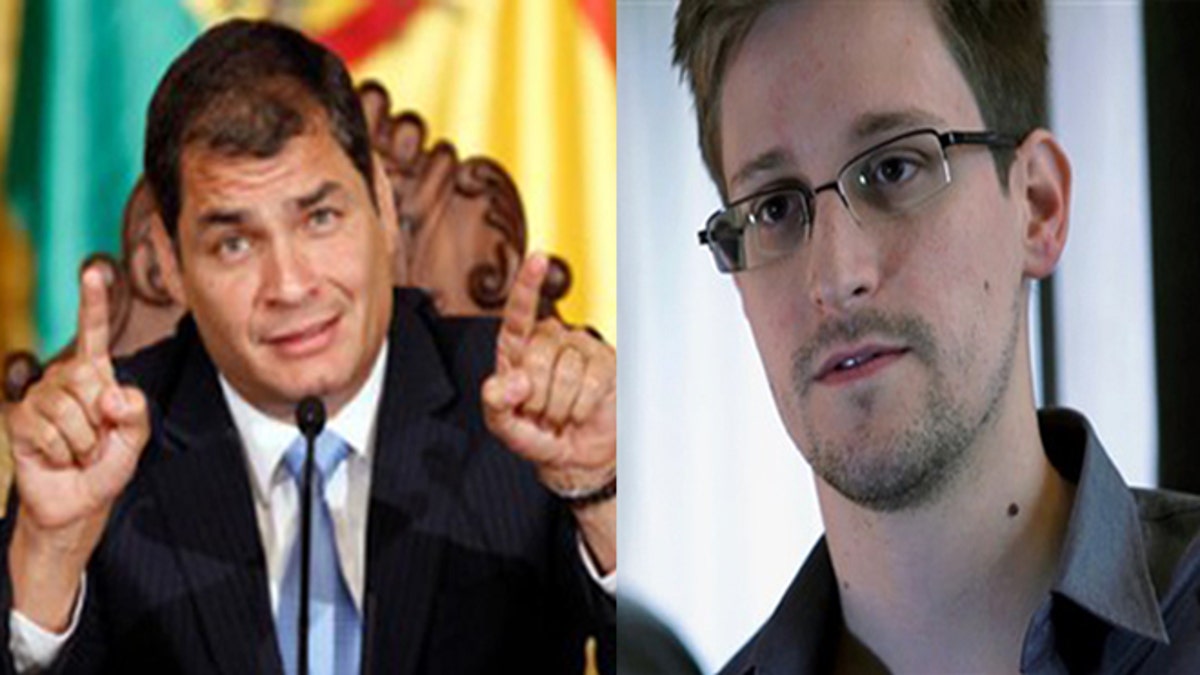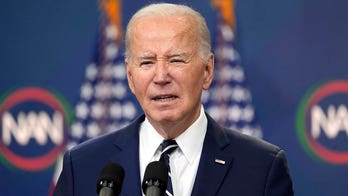
What has become a nightmare for the U.S. government could be a godsend to nations, such as Ecuador, that welcome opportunities to shame the superpower, experts said.
The foreign minister of Ecuador -- a country that has cracked down on government critics and journalists under President Rafael Correa -- said that the South American nation is considering granting asylum to former U.S., National Security Agency contractor Edward Snowden, wanted in the U.S. for revealing state secrets.
Snowden has been on the run since he revealed that the United States has collected data on the telephone calls and emails of its citizens. The United States has filed espionage charges against the 29-year-old Snowden, and is demanding his extradition.
At a press conference on Monday, Ecuador Foreign Minister Ricardo Patiño said his nation’s decision to give consideration to Snowden’s asylum request "has to do with freedom of expression and with the security of citizens around the world."
Patiño said weighing asylum for Snowden was more important than whatever ramifications it would face in U.S.-Ecuador relations. Ecuador has allowed Wikileaks founder Julian Assange, to whom it granted political asylum, to remain at its embassy in London for months.
The chance to needle the United States is almost too irresistible.This is a tremendous temptation for countries like Ecuador, Cuba and Venezuela.
“Ecuador puts its principles above its economic interests,” Patiño said.
Experts on U.S.-Latin America relations said Ecuador is being opportunistic in taking a shot at the U.S.
“The chance to needle the United States is almost too irresistible,” said Michael Shifter, president of the Inter-American Dialogue, a political think tank in Washington D.C.
“This is a tremendous temptation for countries like Ecuador, Cuba and Venezuela. It’s a way they can expose double standards, hypocrisy, a way to say 'the U.S. criticizes us because of clamping down on the press, but look at what the U.S. is doing.’”
Various published reports said that Snowden, who had been in Hong Kong, then traveled to Russia, was to leave for Havana on Monday. But he was not on the flight that was expected to take him to Cuba.
Reports said that he was going to go to Cuba, then Venezuela and possibly end up in Ecuador with hope of receiving asylum and being allowed to live there. Now reports say Snowden may travel to Cuba on Tuesday.
Political leaders in Cuba and Venezuela routinely have harsh words for the United States; former Venezuelan President Hugo Chavez, who died earlier this year, bolstered his international standing among nations that are adversaries of the United States by condemning and often mocking U.S. officials.
Chavez's successor, Nicolas Maduro, has continued the anti-U.S. barbs, even going so far as to accuse the United States of being somehow involved in the death of Hugo Chavez.
Cuban leader Fidel Castro, whose brother Raul succeeded him as president after he fell ill, often assailed U.S. lawmakers and said the U.S.-Cuba embargo amounted to terrorism.
Cuba has no diplomatic relations with the United States, and Havana airport officials often do not stamp traveling documents of Americans who go there in violation of the U.S. embargo and travel restrictions.
Snowden's fate may rest with one of these countries willing to take the political risk and open their doors to him.
“He [Snowden] doesn’t have a lot of choices,” said Robert Anello, a New York attorney who handles extradition cases and white collar crimes. “He’s a political hot potato for other countries. My sense is that it wasn’t his decision to leave Hong Kong. He’s left with those countries that see something to be gained from the political points he can offer them right now.”
And although Cuba and Venezuela may allow him in temporarily, and aid in his transport, they too may not be willing to offer him refuge and deal with long-term consequences, experts said.
Officials of both nations have been in recent talks with U.S. officials about improving aspects of their relations.
Cuba and the United States have been discussing direct mail service, as well as their migration policies.
And U.S. Secretary of State John Kerry, on his first trip to Latin America since taking office, met with Venezuela's foreign minister Elías José Jaua earlier this month to discuss restoring ambassador-level relations and ending more than a decade of steadily deteriorating ties.
Kerry said he was hopeful that a rapprochement could be achieved. The meeting, which came at Venezuela's request, took place just hours after Venezuela released from prison an American filmmaker who had been jailed on espionage charges, removing an immediate irritant in the relationship.
“If Snowden came to Venezuela, they would not hand him over to the United States, they would give him safe haven,” said David Smilde, a researcher with the Washington Office on Latin America, a political think tank.
“But if they gave him [permanent] safe haven, that would seriously harm improved relations.”
Some U.S. lawmakers assailed Snowden for seeking refuge in countries that are sworn enemies of the United States.
“It would not be surprising if the NSA leaker finds safe haven in Cuba or Venezuela, two regimes that have a longstanding history of giving refuge to fugitives from U.S. law," said U.S. Rep. Ileana Ros-Lehtinen in a statement. "Let us not forget that Phillip Agee, former CIA agent, leaked classified information about CIA personnel and fled the U.S. to seek refuge until he passed away in 2008 in Cuba."
"The cruel irony is that there are no press freedoms in either Cuba or Venezuela, yet Snowden who supposedly stands for transparency in government seeks refuge in police states like these two countries," the congresswoman said. "Those who misrule over Cuba and Venezuela, Raul Castro and Nicolas Maduro, do not allow independent free press, do not cooperate on terrorism related issues, disregard due process and an independent judicial system."
Kerry, indeed, warned about serious consequences for any nation that gives Snowden asylum or aids in his transport and evasion of extradition.
Giving Snowden support, said Shifter of the Inter-American Dialogue, would not do much to bolster the popularity of Raul Castro or Correa inside their own nations.
Correa, in particular, already is very popular in his country, having won reelection by a landslide.
“It’s basically about taking on a cause that puts the United States, from their point of view, in a questionable light,” he said. “And it’s trying to associated themselves with what they see as heroes, whistleblowers.”
That said, however, Smilde argued that the United States itself may not want to keep a bright spotlight on the Snowden saga for the long-run.
“Right now there’s a lot of bravado,” said Smilde in a telephone interview from Caracas, where he is conducting research. “Once he gets safe passage, given asylum by some country, this will die down.”
Plus, one must remember that the U.S. State Department is also walking a political tightrope right now, considering the damaging information Snowden revealed.
“This is not flattering to the United States,” said Smilde. “It defends democracy all over the world, and here is someone who has revealed extensive surveillance by the U.S. government of its citizens. They’ll want this to go away.”




